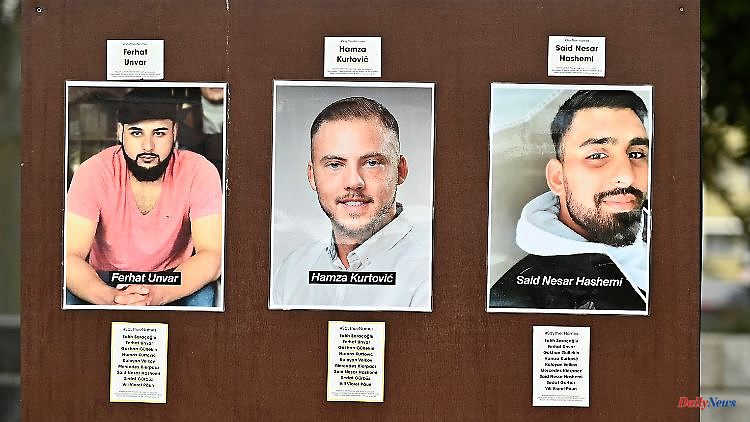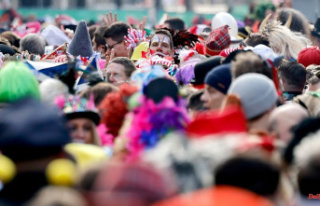For three years now, the relatives of the victims of the racist attack in Hanau have been fighting a bitter battle: they are demanding justice, education and, above all, prevention. But the state hesitates. Although there are many plans in the drawer, there are problems with their implementation.
Anyone who commits a crime must be able to rely on the state. If the rug is ripped from under your feet, for example because a loved one is killed or your own livelihood is destroyed, it is up to the police and the judiciary to ensure justice. They catch the perpetrators, they punish them, they provide compensation for pain and suffering. Vigilante justice is - of course - excluded. Meanwhile, politicians are doing everything they can to prevent similar acts in the future. All this is nothing new, society agreed on this system a long time ago. But what if it fails? When your own son is murdered in a racist attack and the state does not adequately fulfill its tasks - processing, compensation, prevention. "Then we experience the pain again and again," says Serpil Temiz Unvar.
Serpil Temiz Unvar is the mother of Ferhat Unvar - one of the nine people who were murdered by right-wing extremist Tobias R. in Hanau on February 19, 2020. Today marks the third anniversary of the racist terrorist attack. For three years, the relatives of the victims have been fighting for complete clarification of the crime and its background, for the memory, for justice - and for such a right-wing extremist, racist-motivated crime not to be repeated in Germany. At the "Three Years after Hanau" commemorative event organized by the Heinrich Böll Foundation, Serpil Unvar speaks about the challenges and her desperation in this fight.
"We all know what happened three years ago," Unvar begins her speech. That evening in 2020, Tobias R. got into his car with two guns and drove to Hanau's Heumarkt. In two bars he suddenly starts shooting at people. Then he gets back in his car and drives to the second crime scene, Kurt-Schumacher-Platz. There he shoots another six people. In just twelve minutes he kills a total of nine young people. R. takes a strategic approach to his attack - he chooses victims with an apparent migration background. The perpetrator then kills himself and his mother.
Ferhat was 23 years old when he died. He was her first child, writes Serpil Temiz Unvar on the website of the educational initiative that she founded after his death. Unvar wants to offer a contact point to children and young people who have experienced racism. The initiative, which she named after her murdered son, also stands as a memorial against forgetting the victims from Hanau.
"If we don't want something like this to happen again, we need memorials that remind us of it," says Unvar. She particularly emphasizes this sentence, her eyes get smaller. For some time, the mother has been fighting for a memorial on the market square in Hanau, but according to her, the city rejects it. For Unvar a sign that "the nine children who were killed should be forgotten". It's not the first time she's felt let down by the state. As the most recent example, she cites the perpetrator's 75-year-old father, who apparently has the same right-wing extremist and racist world view as his son. The man has been visiting her house for months, harassing and threatening her, reports Unvar, adding: "Nobody does anything about it, nobody protects us."
Said Etris Hashemi shares this sentiment. The 26-year-old lost his brother in the attack in Hanau, he survived with serious injuries. The fact that the enlightenment got underway at all is a great achievement of the relatives. Hashemi focuses on the "insensitive and sometimes disrespectful" way the authorities treat relatives. For many, this felt "like a second attack," he describes the time after the crime at the memorial event. He himself is now committed to improving the sensitivity of the authorities.
What the brother of the killed Said Nesar Hashemi complains about is also part of the investigations by the committee of inquiry into the crime in the Hessian state parliament. He is supposed to find out whether the authorities acted negligently before, during and after the terrorist attack in Hanau. Some relatives were not sufficiently informed until days after the crime, and they had no opportunity to say goodbye to the victims before the autopsy. Questions also arise: Why was the emergency call not available on that momentous night? Could at least the victims at the second crime scene have been prevented? And why did Tobias R. have a gun license? His right-wing extremist sentiments were well known - weeks before the crime he published a racist manifesto on the Internet. The results of the U-committee are to be published at the end of the legislative period and used to prevent similar acts.
Social worker Liisa Pärssinen is skeptical. "None of this is new knowledge," she complained at the commemoration event. "It's all there already." The head of a counseling center for those affected by right-wing and racist violence recalls the racist attacks in Mölln in 1992, Solingen in 1993, Munich in 2016 and the NSU murders. A lot has happened in politics since then: Former interior minister Horst Seehofer presented an 89-point plan to fight extremism and racism, while the current minister, Nancy Faeser, drew up ten measures.
However - this becomes clear at this commemoration event, in which politicians also take part - there is a catch: "We have an overall strategy, but we are not yet specific enough," says Green MP Misbah Khan. Or to put it another way: there are plans, but implementation is lacking in many places. Neither the tightening of the gun law nor the reduction of bureaucracy for financial support for victims of racist acts are making any real progress. There are also problems when it comes to combating hate online. Germany urgently needs a real leap in the fight against racism, as the Democracy Center at the University of Marburg recently emphasized. Accordingly, the number of people reporting racist incidents is increasing.
Right-wing extremism researcher Wilhelm Heitmeyer says that in order to get to the root of incidents like these, you have to start with attitudes in society. Because there lies the core of the legitimacy for further racist escalation levels. The professor at Bielefeld University describes this as an onion model. The outer shell is made up of prejudices and people's behavior - starting with right-wing slogans from the uncle at the Christmas table to racist remarks from acquaintances or in the sports club. They justify the next stage, authoritarian national radicalism with the AfD at its core.
These levels often have nothing to do with violence or right-wing extremism in its full brutality, explains Heitmeyer. However, the next, increasingly violent groups - up to and including terrorist annihilationists - would not exist without them. Each shell, as the scientist describes it, needs its legitimacy through the shells above it. That means: The fight against racism and the prevention of future crimes will not succeed "if we are not able to see the connection and only ever discuss individual layers and individual racist incidents," Heitmeyer concludes his speech at the memorial event.
To this day, the relatives of the victims from Hanau do not have the feeling that they can fully rely on the state - neither in the investigation of the racist attack nor in prevention. On the contrary: it was only through their pressure and perseverance that the investigative committee in the state parliament was formed. And the relatives of Serpil Temiz Unvar have achieved something else: never before has the focus been placed so much on the victims and not on the perpetrator. To this day, posters throughout Germany and posts on social media commemorate the murdered: Hamza Kurtović, Said Nesar Hashemi, Vili Viorel Păun, Mercedes Kierpacz, Kaloyan Velkov, Fatih Saraçoğlu, Sedat Gürbüz, Gökhan Gültekin and Ferhat Unvar.












